Europe
U.S. diplomat praises Germany policy towards Ukrainian refugees
Embassy Cultural Attaché Cherrie Daniels spoke with Blade on July 22
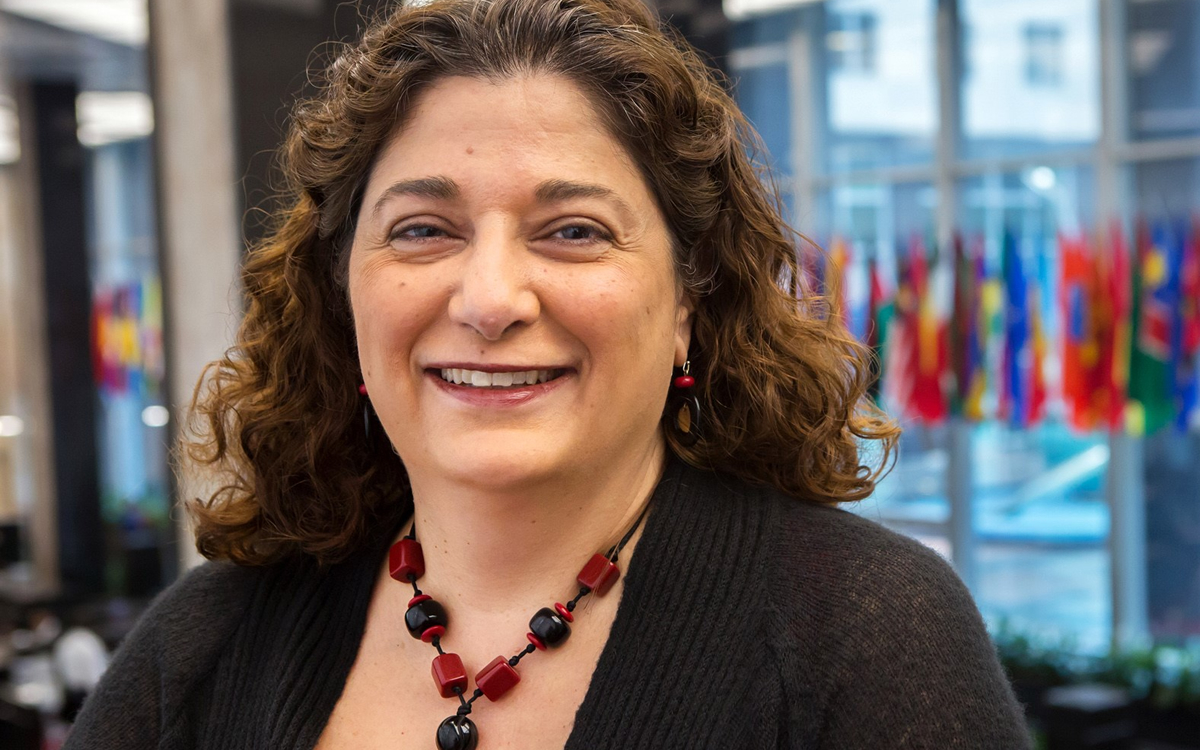
BERLIN — The cultural attaché at the U.S. Embassy in Germany has applauded the German government’s efforts to welcome Ukrainians who have sought refuge in the country.
“The German government and the municipalities and the 16 states have been extremely welcoming of Ukrainian refugees in Germany,” Cherrie Daniels told the Washington Blade on July 22 during a virtual interview from the embassy in Berlin.
More than 900,000 Ukrainians have arrived in Germany since the war began on Feb. 24.
Ukrainians are able to enter Germany without a visa.
Ukrainians, Russians, Iranians, Syrians, Algerians, Ghanaians and people from more than a dozen other countries attended a roundtable on LGBTQ and intersex refugees the embassy co-hosted with the Canadian Embassy in Germany on July 19. ORAM Executive Director Steve Roth and representatives of Germany’s Lesbian and Gay Association, Queer Refugees Deutschland, Human Rights Watch, Quarteera and Miles also participated.
“We can and must promote the protection of vulnerable LGBTQI+ refugees and asylum seekers,” said U.S. Ambassador to Germany Amy Gutmann. “These people are the most vulnerable of the vulnerable and we can and we must respond to human rights abuses. And we can and we must engage international organizations on the human rights of LGBTQI+ persons.”
Daniels said one of the issues roundtable participants discussed was “making sure that asylees get appropriate legal counseling before their asylum hearing.”
“Every country, including the United States and Germany, could do better,” she told the Blade.
Daniels added the roundtable’s overall goal was “to listen to what (participants’) challenges are in the countries they come from.”
“Our job is to listen to what those challenges are and see what our embassies in those regions or what the State Department at-large in the White House can do to support their additional inclusion and equal rights for them,” she said.
Daniels spoke with the Blade a day before Berlin’s annual Christopher Street Day parade took place.
The embassy, which is adjacent to Berlin’s Brandenburg Gate. was flying several Progress Pride flags in the days leading up to the parade. The canopy over the embassy’s main entrance was also adorned in rainbow colors.
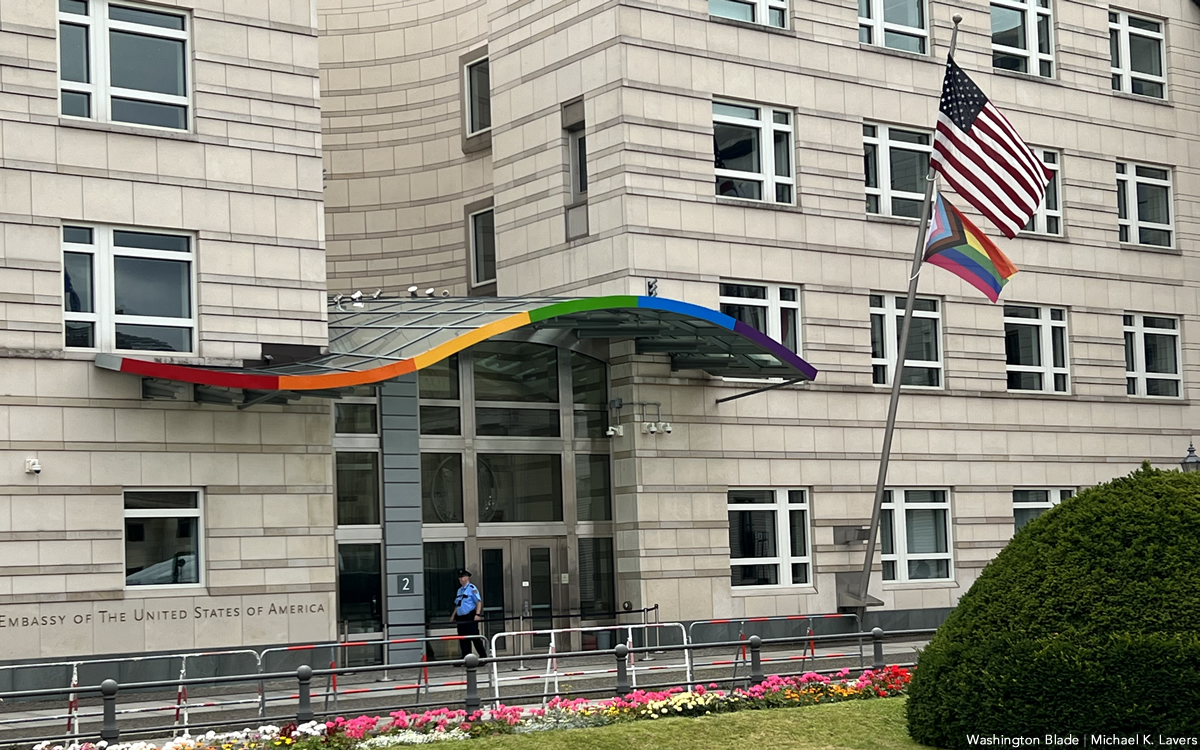
The embassy — along with the U.S. Consulates in Frankfurt, Düsseldorf, Leipzig, Hamburg and Munich — on July 6 hosted a discussion about LGBTQ and intersex issues in sports. Former Washington Spirit player Joanna Lohman, Portland Thorns coach Nadine Angerer and former German soccer player Marcus Urban participated.
Lohman is a lesbian, while Angerer and Urban are openly bisexual and gay respectively.
The embassy has also launched “UnterFreunden,” a podcast with an episode that highlights LGBTQ+ and intersex issues.
“What we wanted to assure is that we don’t only celebrate Pride during Pride Month, in June or July in Germany,” Jesse George, the embassy’s public diplomacy and media advisor, told the Blade during the interview with Daniels. “So we are amplifying and doing outreach regarding the LGBTQI+ community all year long.”
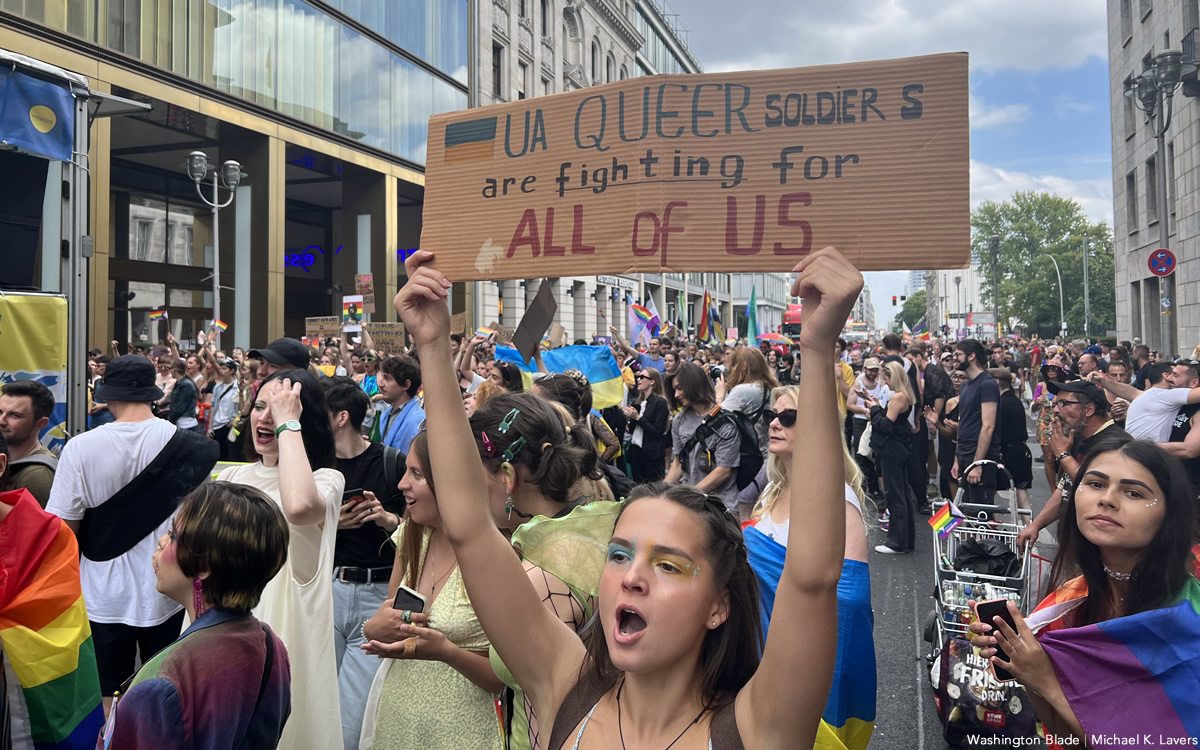
President Joe Biden in February 2021 signed a memo that committed the U.S. to promoting LGBTQ and intersex rights abroad as part of his administration’s overall foreign policy. The White House in the same year named Jessica Stern, who was previously the executive director of OutRight Action International, as the next special U.S. envoy for the promotion of LGBTQ and intersex rights abroad.
The State Department in April began to issue passports with “X” gender markers. Stern during an exclusive interview with the Blade ahead of Pride Month noted the Biden administration’s continued support of LGBTQ and intersex rights abroad also includes marriage equality in counties where activists say it is possible through legislative or judicial processes.
“When together we stand up for LGBTQI+ persons, we stand up for the work of building a country and a world where everyone belongs and everyone’s rights are respected, no matter who they are or who they love,” said Gutmann during the July 19 reception.
The U.S. Supreme Court on June 24 struck down Roe v. Wade.
Justice Clarence Thomas in his concurrent opinion said the Supreme Court should reconsider the decisions in the Obergefell and Lawrence cases that extended marriage equality to same-sex couples and the right to private, consensual sex.
The Respect for Marriage Act, which would codify marriage equality into federal law, passed in the U.S. House of Representatives last month with 47 Republicans voting in favor of it. The bill needs 60 votes in the U.S. Senate to overcome a potential filibuster.
Daniels said the Roe ruling is “definitely” on the minds of LGBTQ and intersex activists in Germany and “on our mind.”
“What we can do as an administration is to stand in solidarity with those marginalized communities and, of course, for women’s and girls’ rights and for reproductive rights globally,” she said. “That is something we can do as a State Department, as a foreign policy agency.”
Richard Grenell represented U.S. in Berlin from 2018-2020
Former U.S. Ambassador to Germany Richard Grenell, who is openly gay, represented the U.S. in Berlin from 2018-2020.
The previous administration tapped Grenell to lead an initiative that encourages countries to decriminalize consensual same-sex sexual relations. The Blade last August filed a lawsuit against the State Department in federal court in D.C. that seeks Grenell’s emails about the initiative.
The embassy during Grenell’s ambassadorship hosted a group of LGBTQ and intersex rights activists from around the world. Grenell and then-U.S. Ambassador to the U.N. Kelly Knight Craft in 2019 organized an event on the sidelines of a U.N. Security Council meeting that focused on decriminalization efforts around the world.
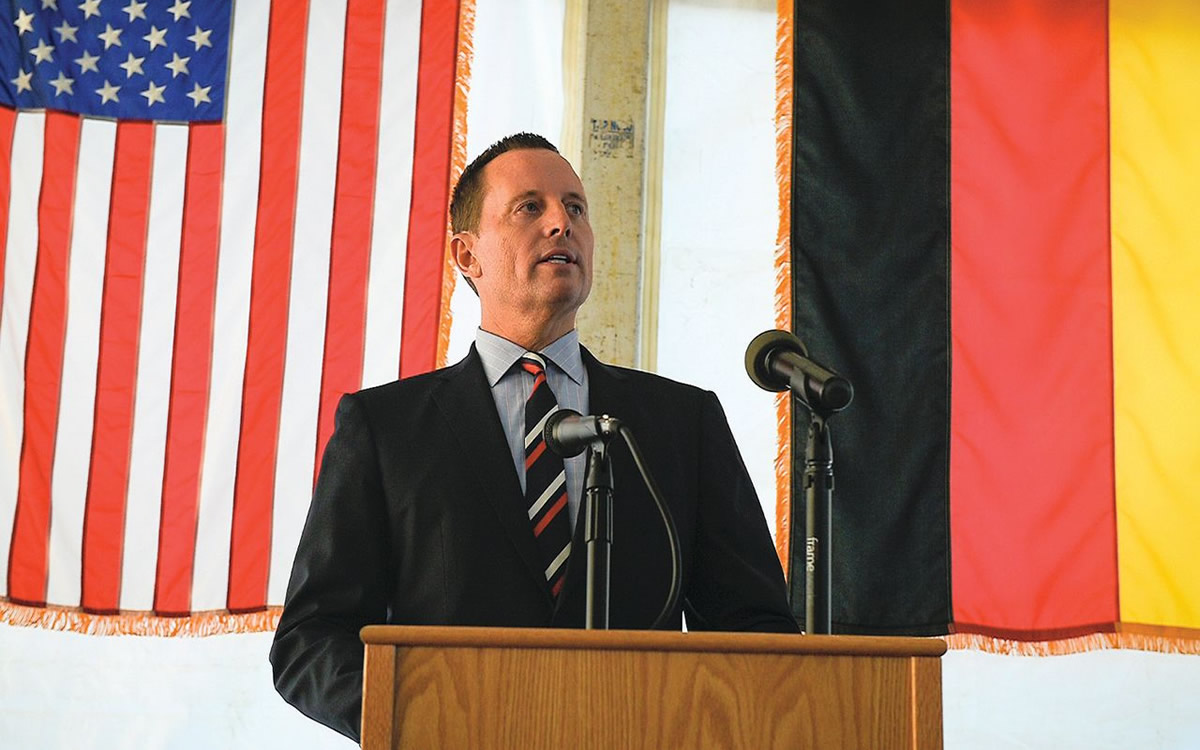
Grenell, among other things, faced condemnation from politicians in Germany who accused him of supporting far-right politicians and attempting to interfere in German politics. Advocacy groups in the U.S. and around the world also sharply criticized Grenell over his outspoken support of then-President Donald Trump.
Daniels did not specifically discuss Grenell during the interview. Daniels said in reference to the embassy’s work in support of LGBTQ and intersex rights that “people had been invited to the embassy in that period for certain public events.”
“Now having our doors wide open and showing this inclusive face of the United States, you know, I’ll let other people draw that contrast,” she said.
“In these four walls so to speak, we’re hearing, we’re listening and steering to the extent we can, sharing our policies and programs in a way that will address how can we improve that message of inclusion and of equal rights as LGBTQ rights or human rights,” added Daniels. “It’s not some niche issue. It’s mainstreamed into all of our policies.”
Daniels further stressed “that’s a difference that you’re going to see.”
“Again, it’s not flying the flag on Pride Month, although that’s wonderful,” she said. “It’s fighting for those rights, and all of our programs and all of our outreach and ensuring that that’s human rights. It’s not something that’s just for a particular, you know, trying to show that we do it. I think people can feel that inclusion when they’re in the company of this embassy.”
Hungary
Upwards of 100K people march in Budapest Pride
Participants defined Hungarian government’s ban on public LGBTQ events
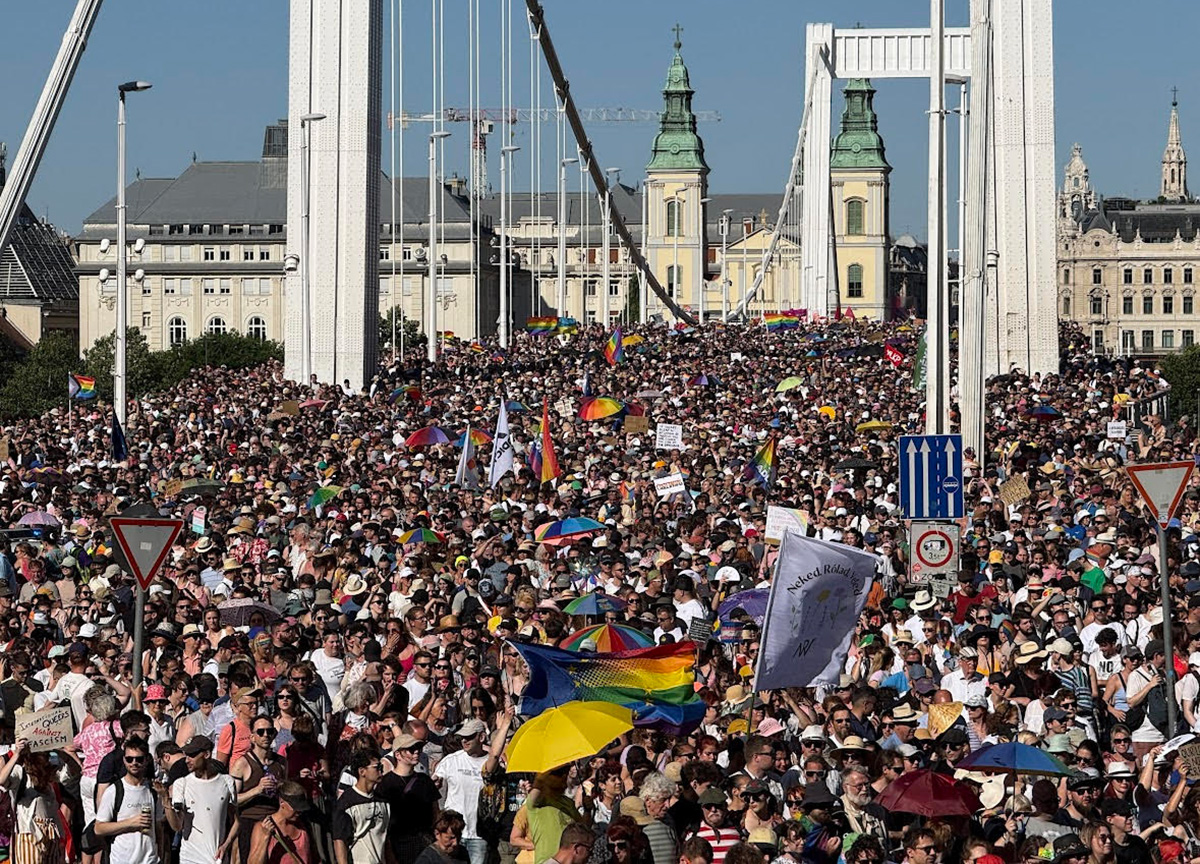
More than 100,000 people on Saturday defied the Hungarian government’s ban on public LGBTQ events and participated in the 30th annual Budapest Pride parade.
The New York Times published a picture that shows throngs of people marching on Budapest’s Erzsébet Bridge over the Danube River. Openly gay MEP Krzysztof Śmiszek, who was previously Poland’s deputy justice minister, is among the dozens of European lawmakers who participated in the march that began at Budapest City Hall.
The New York Times reported Hungarian police officers stood along the march, but they did not try to stop it. Śmiszek described the march to the Washington Blade as “beautiful and huge.”
“[It was] very peaceful and political,” he said.
Prime Minister Viktor Orbán and his Fidesz-KDNP coalition government have faced widespread criticism over its anti-LGBTQ crackdown.
Hungarian lawmakers in March passed a bill that bans Pride events and allow authorities to use facial recognition technology to identify those who participate in them. MPs in April amended the Hungarian constitution to ban public LGBTQ events.
Budapest Mayor Gergely Karácsony endorsed the march, even though Orbán’s government threatened to arrest him and fine participants.
“Today a country shows that no ruling party can tell it on what topic, for what cause it is allowed to march and why not,” said Budapest Pride President Viktória Radványi on Saturday in a Facebook post. “A country demonstrates that whoever will be in government can count on us: dedicated, persistent citizens intolerant to oppression, who will organize themselves and stand against tyranny with their heads held high.”
More than two dozen activists in D.C. who protested outside the Hungarian Embassy on Friday expressed their support for Budapest Pride.
(Washington Blade video by Michael K. Lavers)
District of Columbia
Activists protest outside Hungarian Embassy in DC
Budapest Pride scheduled to take place Saturday, despite ban

More than two dozen activists gathered in front of the Hungarian Embassy in D.C. on Friday to protest the country’s ban on Budapest Pride and other LGBTQ-specific events.
Amnesty International USA Executive Director Paul O’Brien read a letter that Dávid Vig, executive director of Amnesty International Hungary, wrote.
“For 30 years Budapest Pride has been a celebration of hope, courage, and love,” said Vig in the letter that O’Brien read. “Each march through the streets of Budapest has been a powerful testament to the resilience of those who dare to demand equality, but a new law threatens to erase Pride and silence everyone who demands equal rights for LGBTI people.”
“The Hungarian government’s relentless campaign against LGBTI rights represents a worrying trend that can spread normalizing division and hatred,” added Vig. “Thank you for standing with us when we refuse to be intimidated.”
Council for Global Equality Chair Mark Bromley and two of his colleagues — Stephen Leonelli and Keifer Buckingham — also spoke. Health GAP Executive Director Asia Russell and Chloe Schwenke, a political appointee in the Obama-Biden administration who worked for the U.S. Agency for International Development, and Planned Parenthood staffers are among those who attended the protest.
(Washington Blade video by Michael K. Lavers)
Hungarian lawmakers in March passed a bill that bans Pride events and allow authorities to use facial recognition technology to identify those who participate in them. MPs in April amended the Hungarian constitution to ban public LGBTQ events.
Budapest Pride is scheduled to take place on Saturday, despite the ban. Hundreds of European lawmakers are expected to participate.
“Sending strength to the patriotic Hungarians marching tomorrow to advance human dignity and fundamental rights in a country they love,” said David Pressman, the gay former U.S. Ambassador to Hungary, on Friday on social media.
Sending strength to the patriotic Hungarians marching tomorrow to advance human dignity and fundamental rights in a country they love. Szabadság és szerelem. My past remarks on Budapest Pride: https://t.co/y1QhA9QouA
— David Pressman (@AmbPressman) June 27, 2025
Spain
Barcelona bids to host WorldPride in 2030
Activists from Spanish city traveled to D.C. this month
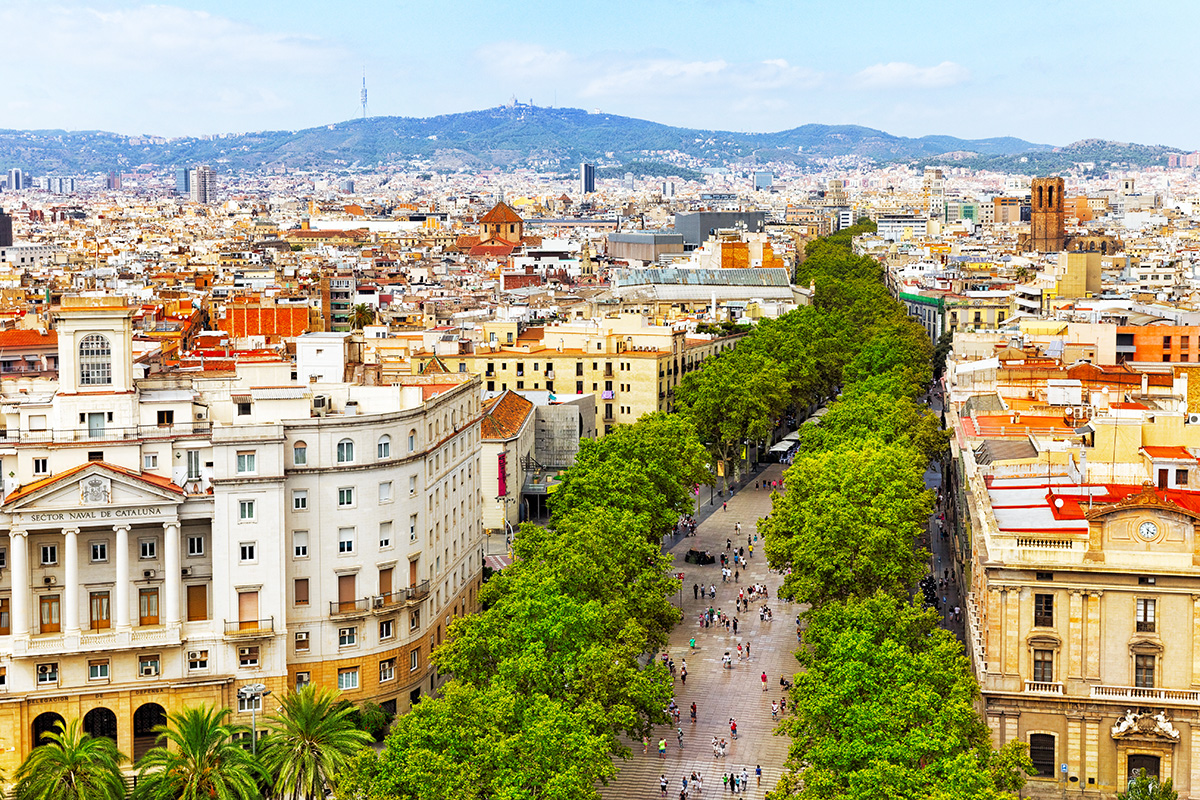
A group of activists from Barcelona traveled to D.C. earlier this month to promote their city’s bid to host WorldPride in 2030.
Pride Barcelona Vice President Maria Giralt, WorldPride Barcelona 2030 Project Manager Andoni Ibáñez, and Pride Barcelona’s Roger Presseguer on June 4 presented the city’s bid at a José Andrés-catered event at the Spanish Cultural Center in Northwest Washington.
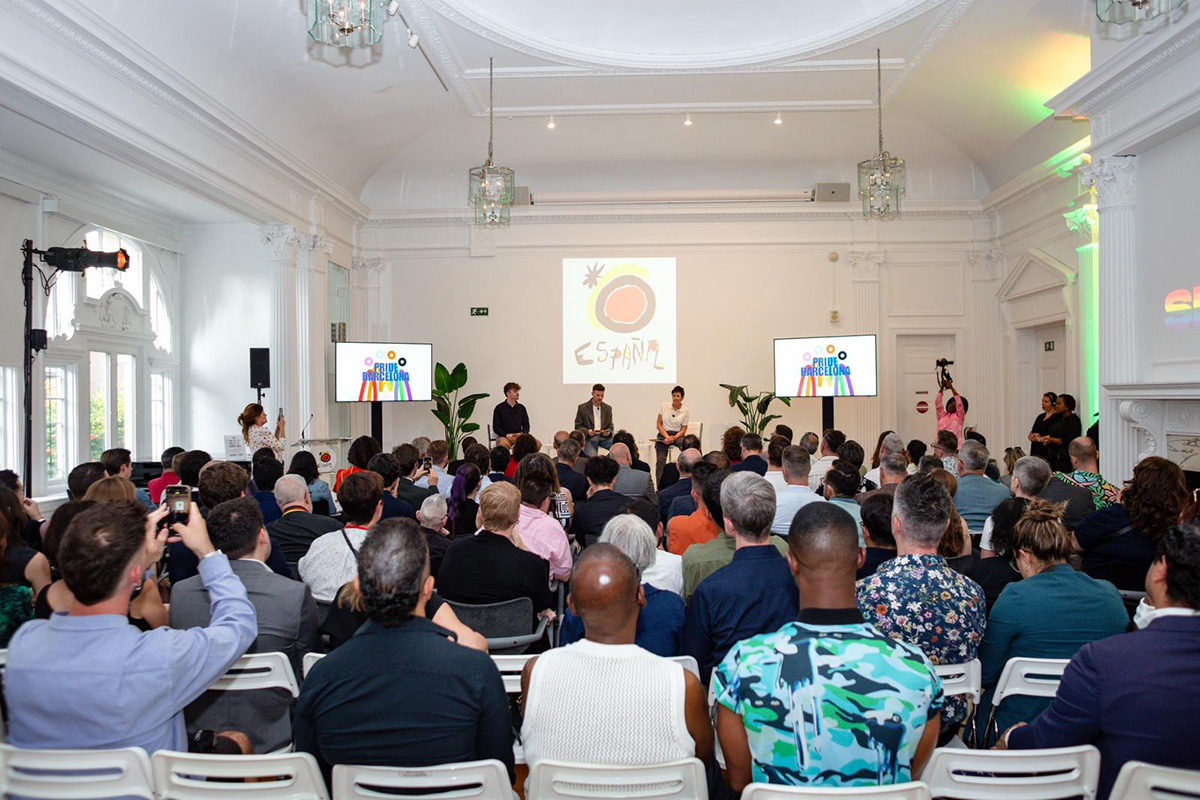
Catalonia LGBTI+ Public Policies General Director Alberto Lacasta, Barcelona City Commissioner Javier Rodríguez, and Barcelona Turisme Director Rosa Bada traveled to D.C. with the activists. Giralt, Ibáñez, and Presseguer visited the Washington Blade’s office on June 6.
“We intended to transmit the spirit of our candidacy,” said Giralt.
Giralt noted 39 LGBTQ groups in Barcelona and throughout Catalonia support the bid. The Catalonian government and Spain’s Tourism Institute, known as Turespaña, have also backed it.
“Spain and the ministry have helped us a lot,” said Giralt.
Madrid, the Spanish capital, hosted WorldPride in 2017. The activists’ trip to D.C. coincided with WorldPride 2025 that took place in the nation’s capital.
Spanish Sen. Carla Antonelli, who is transgender, is among those who participated in the WorldPride 2025 Human Rights Conference. Turespaña also had a booth at the Capital Pride Festival.
Next year’s WorldPride will take place in Amsterdam, while Cape Town will host WorldPride 2028. Montreal, London, and Bangkok are the three other cities that have bid to host WorldPride 2030.
InterPride, the organization that coordinates WorldPride events, will announce the winning bid in 2026.
“What better occasion than to come to Washington to present (the bid) and to also connect with other countries around the world,” said Giralt. “This approval is very important, especially at this time when there is a wave, a drift, toward the extreme right, and we believe it is very important for all the world’s greats to be present, to be clear that the fight. The resistance must continue.”
Spain’s first LGBTQ rights march took place in Barcelona on June 26, 1977, less than two years after long-time dictator Gen. Francisco Franco died. Spain is now one of the world’s most LGBTQ-friendly countries.
“What we’re trying to do from Barcelona is to recover a little of this struggle’s origins,” Giralt told the Blade.
‘A historic moment to be in Washington’
WorldPride 2025 took place less than five months after the Trump-Vance administration took office.
Egale Canada, one of Canada’s largest LGBTQ advocacy organizations, in February announced its members would not participate in WorldPride or any other event in the U.S. because of the White House’s policies. Equality Australia in April issued a travel advisory for transgender and nonbinary people who plan to visit the U.S. in response to President Donald Trump’s executive order that directed the federal government to recognize only “two genders, male and female” and banned the State Department from issuing passports with “X” gender markers.
Phyll Opoku-Gyimah, the co-founder of UK Black Pride known as Lady Phyll, spoke at the WorldPride 2025 Human Rights Conference’s opening plenary virtually after the U.S. revoked her eligibility to enter the country without a visa because she had traveled to Cuba earlier this year.
The U.S. Customs and Border Protection website notes the State Department on Jan. 12, 2021, designated Cuba as a state sponsor of terrorism. The CBP website notes that with “limited exceptions, a traveler who is found to have visited Cuba on or after this date is not eligible for travel under the Visa Waiver Program (VWP) using an Electronic System for Travel Authorization (ESTA) and must apply for a visa to travel to the United States.”
Ibáñez told the Blade that he, Giralt, and Presseguer felt it was important for them to travel to the U.S. for WorldPride.
“We feel that it was a historic moment to be in Washington celebrating and fighting for our rights within the context of Trump,” said Ibáñez.
“It was very important for us to come here and share our values and claim next to your (White House) and say, hey, we’re here and we’re never going to go away,” added Ibáñez.
-

 Virginia1 day ago
Virginia1 day agoDefying trends, new LGBTQ center opens in rural Winchester, Va.
-

 South Africa4 days ago
South Africa4 days agoLesbian feminist becomes South African MP
-

 Travel3 days ago
Travel3 days agoManchester is vibrant tapestry of culture, history, and Pride
-

 Opinions2 days ago
Opinions2 days agoUSAID’s demise: America’s global betrayal of trust with LGBTQ people









